By Stephanie Vosk
The term ‘tenure’ represents a golden goal for professors to work toward. The questions is, once an academic becomes tenured, what is next?
As described in Northeastern’s faculty handbook, “the purpose of academic tenure is to insure academic freedom for the faculty member – the right to teach, study and engage in research free from restrictions and pressures which otherwise might inhibit independence of thought and expression.”
Upon hiring, faculty members are generally considered “tenure track” or “non-tenure track.” There is a lengthy process to achieve tenure status that takes approximately a year to conclude.
Assistant History Professor and Assistant to the University Council Gerald Herman explained, however, that tenure can either make or break a professor’s career. As one professor explained it, it is either up or out.
“If you come up for tenure in the sixth year and you fail to get it, the contract you get in the seventh year is a terminal contract,” Herman said.
If tenure is granted, permanent employment is not granted, because the Board of Trustees only offers one-year contracts, but Herman admits it is likely.
“It is sort of splitting hairs because if you have the right to receive a contract, obviously you are going to get a contract every year,” he said.
In extreme cases a faculty member can be removed.
“If a (tenured) faculty member does something that is beyond the bounds, then there is a procedure for dismissing that faculty member,” Herman said.
“‘Beyond the bound’ would mean that a tenured professor abandons his/her teaching responsibilities completely or participated in an act of extreme misconduct,” as stated in the faculty handbook.
In Northeastern’s history, only three hearings have taken place to take action against a faculty member.
“Dismissal happens rarely, and it should happen rarely,” Herman said.
In addition to job security, tenured professors are offered a large degree of academic freedom.









